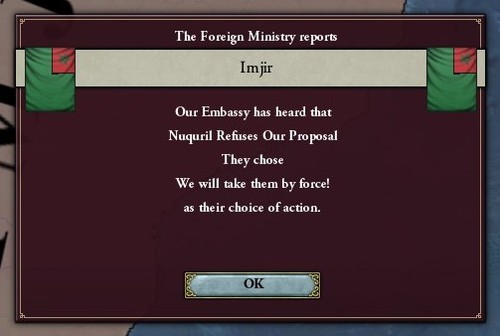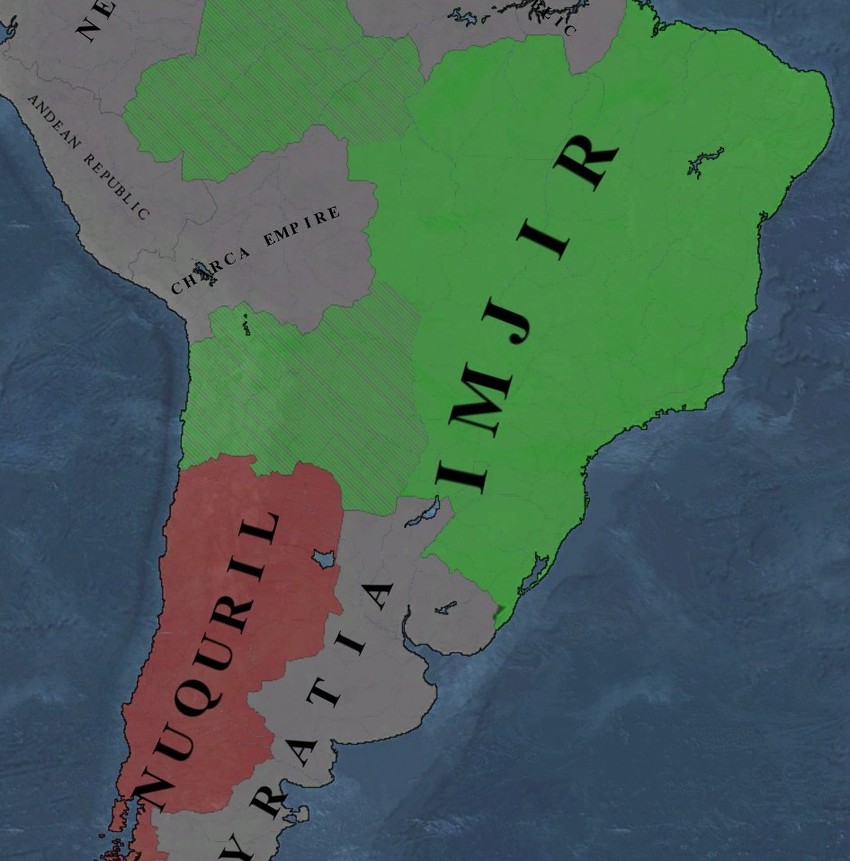Part 83: The Sham Congress
Chapter 3 - The Sham Congress - 1840 to 18451840 begins with sorrow in Al Andalus, as the beloved Raed Zulfiqar dies in his sleep, but the sorrow is quickly replaced with uncertainty and excitement as his son and successor prepares for his coronation. Already quite old at 40 years of age, Utbah Zulfiqar had served under his father as a commander and tactician for decades now, and those years in the military seem to have instilled strong conservative values in him, with the new Sultan of Al Andalus being a political moderate and outspoken pacifist.

As his oldest son and chosen heir, Utbah was always the most likely successor, and the Majlis al-Shura confirmed his accession just a few days after Raed’s death. And determined to avoid any potential dynastic squabbles, the Majlis scheduled the coronation for a scant few weeks later, with Ubtah crowned as the new Sultan of Al Andalus in relatively small and inexpensive ceremony.
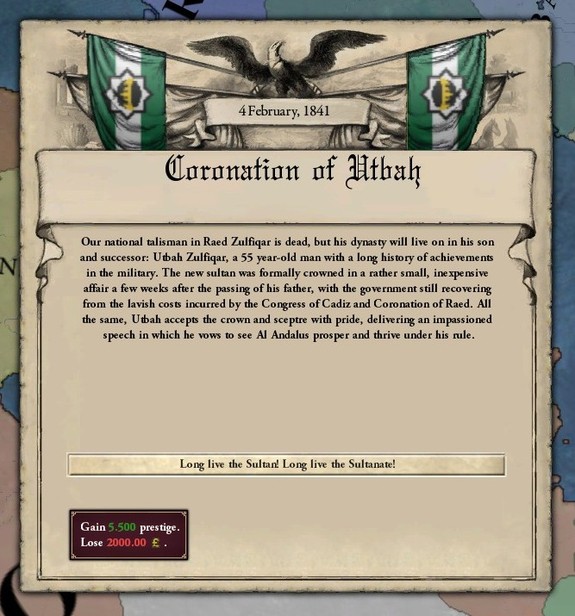
And the political instability wasn’t over just yet, with the Grand Vizier also dying in office a few months later. The Majlis had more difficulty appointing a successor this time, with the moderates halfway into their term and losing steam in the assembly, but they eventually decided on bipartisan candidate in Uthman al-Houd - a famous veteran with plenty of experience in the Tirruni Wars.

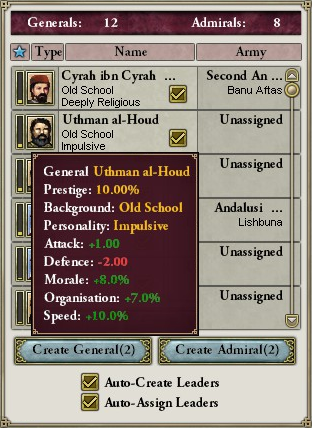
With the necessities over and done with, the Moderate government could turn their attention back to internal matters, as their first new manufactories finally completed construction early into the year. A steelworks was launched in Majrit, where abundant iron ores were located, quickly followed by the opening of a liquor distillery in Ishbiliya.


Further south, meanwhile, much more interesting developments were being made in Africa. Benin had always been the most advanced West African kingdom (and the only one with overseas colonies), but it had fallen far behind Europe and North Africa by the 1830s, and was now being threatened and intimidated by prospective colonial powers.
The ascendence of a new king to the Beninese throne, however, promised to change all of that. Young and idealist, Eweka V was determined to enact far-reaching reforms and drag his country into the modern age, kicking and screaming if he must.

In the Near East, on the other hand, the Sharifate of Mecca was well on the way towards modernisation. They had already reformed their administration and military, with generous assistance from France and Morocco, and now looked to finally unifying the Arabian peninsula under their rule.

And indeed, just a few months into 1840, Hejaz escalated a border raid with Yemen into an all-out invasion. Yemen’s irregular levies could do little when faced with the well-drilled Hejazi troops, offering scarcely any resistance as the invaders pushed towards Aden, which fell after a few weeks of siege.

To the Far East, meanwhile, another war was on the verge of breaking out in China. The Wu dynasty had managed to consolidate vast stretches of land under their rule, bullying the southern Chinese states into submission, and now looked to knock the Mongols off their perch and finally seize the Mandate of Heaven.


With the Mongols now distracted, the Japanese were free to invade Yereven without opposition or interference, doing just that a few weeks later.

Jumping back to Iberia, the first railways finished construction in the dying days of 1840, linking the cities of Qadis and Ishbiliya. Still very experimental in nature and relying heavily on horse-drawn labour, the Qadis-Ishbiliya Railway allowed for much faster transport of passengers and goods between the two regional trade centres.

The railroad quickly proved to be a commercial and financial success, which led to the Majlis cautiously backing the construction of further railways in Al Andalus, including the extension of the Qadis-Ishbiliya line to Batalyaws.
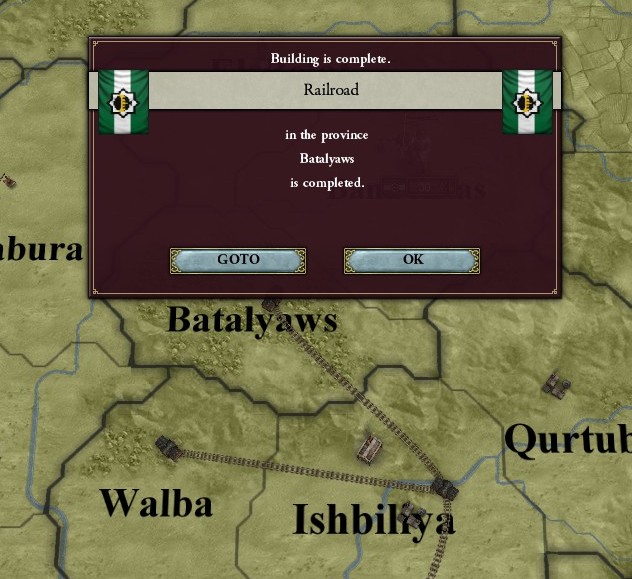
At the same time, the recently-expanded University of Qadis produced its first batch of new graduates, including a wide array of chemists, mathematicians, physicians, doctors and biologists, youngsters who would spearhead the many scientific advancements, discoveries and innovations of the 1800s.
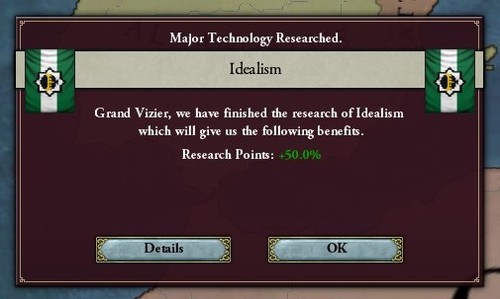
Sultan Utbah, meanwhile, had been busy sponsoring various public projects and proposals in an effort to solidify popular support for the monarchy. The first of these projects would complete construction later the next year, with the opening of the Royal Academy of Al Andalus in Tulaytullah, an institute of higher learning built as an alternative for students in northern Iberia.
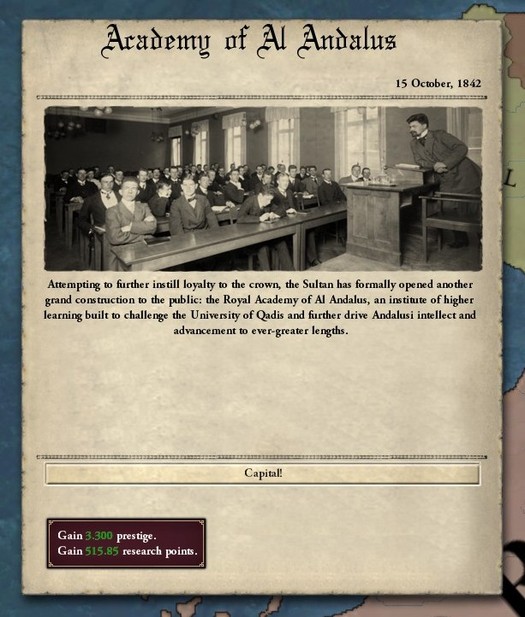
The Academy of Al Andalus would quickly grow to rival the University of Qadis in enrollment and graduate numbers. A heated competition to attract gifted scholars and make prestigious discoveries would quickly develop between the two schools, sparked off when a noted Majriti astronomer became the first person to observe the planet of Neptune early into 1843. The discovery was quickly publicised in newspapers across the country, of course, further encouraging the rivalry and piquing public interest in scientific advancements.

Needless to say, the moderate government had performed impeccably thus far, sticking to their campaign promises and avoiding hostility on the international stage. It wasn’t very long before public adoration turned into criticism, however, as a devastating blight broke out in Central Iberia early in 1842.
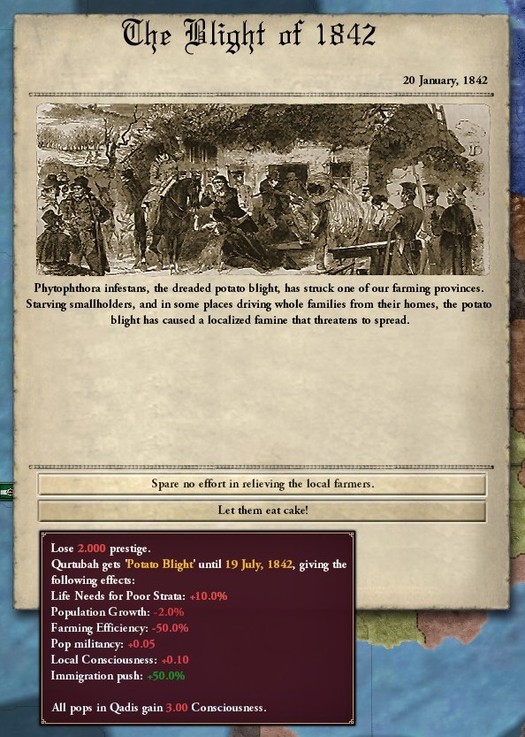
Across the straits, meanwhile, an important development was made with the formation of a Moroccan-Celtic alliance.
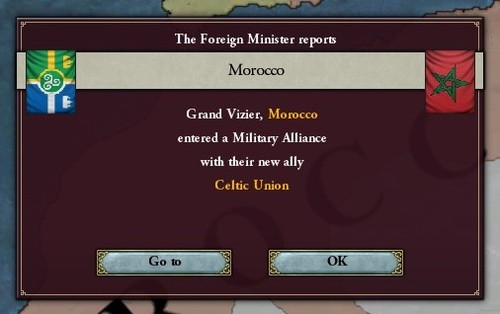
The Celts had managed to claw their way back into relevance on the world stage, primarily due to a series of prestigious innovations and inventions, and were itching for war again. In fact, a sudden wave of nationalism culminated in the Celtic government announcing an ambitious initiative in April of 1842, promising to one day bring all "Celtic peoples" back under their rule, including the Welsh and Bretons currently ruled by France.
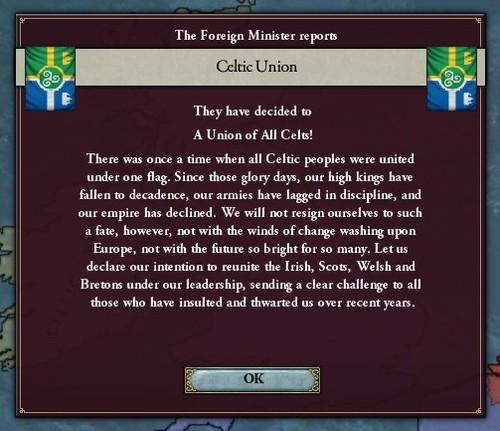
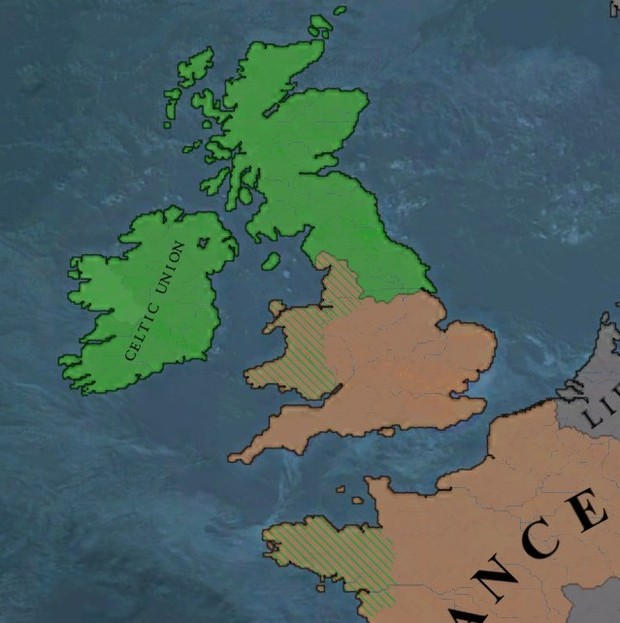
The Moroccans, meanwhile, had managed to seize the upper hand in the Great Gharbian Revolt, and a Moroccan victory was looking increasingly inevitable to spectators and experts alike.
The scorching summer of 1842 brought an unexpected twist with it, however, as the Revolutionary Republic of Ibriz pledged to support Imjir’s bid for independence.
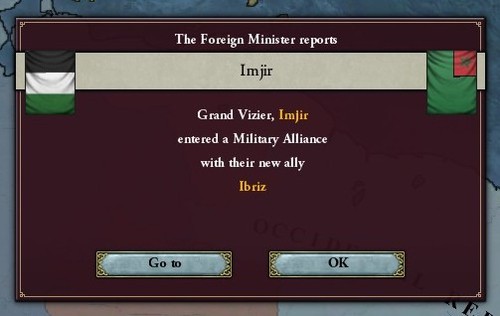
And true enough, it wasn’t long before Ibrizi arms and supplies began to find their way into rebel hands, inspiring a sudden reversal of fortunes. Launching a massive counter-attack from Imariz, their base of operations, Imjiri troops managed to push back Almoravid forces and retake the colonial capital of Port Almoravid.
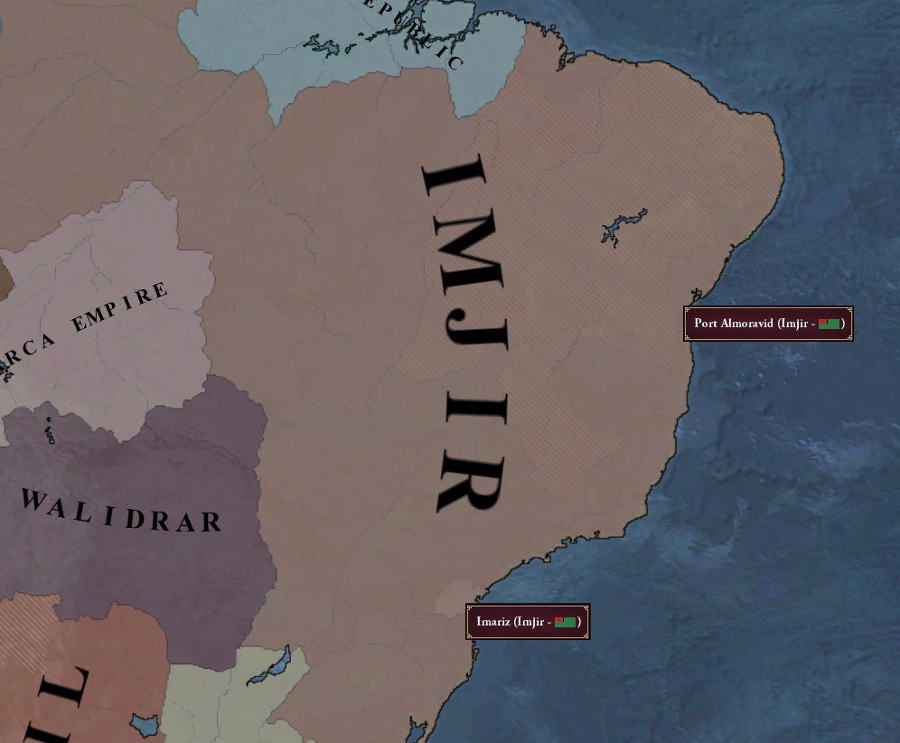
With that, everyone’s guesses as to what would happen next were up in the air, as Imjiri troops dug in and the Moroccans intensified their war effort.
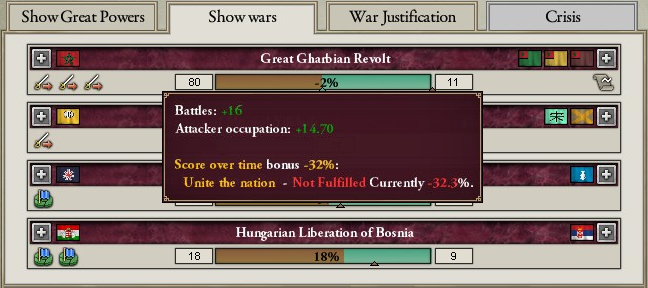
Politicians in Al Andalus didn’t have much time to react to the turnaround in Gharbia, however, as they were hit with another crisis late in the year. A relatively minor flu outbreak in Baja somehow spiralled into a country-wide pandemic, with hundreds of thousands of people infected within months, before being carried to neighbouring countries by merchants and travellers.
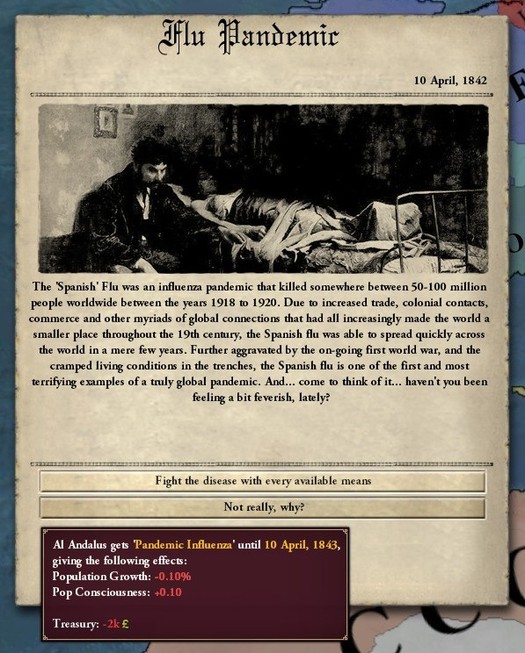
The influenza crisis quickly sent the Majlis into chaos, with the assembly unable to agree on how to best combat it, and their problems were only compounded by the outbreak of several cholera epidemics over the course of the year.
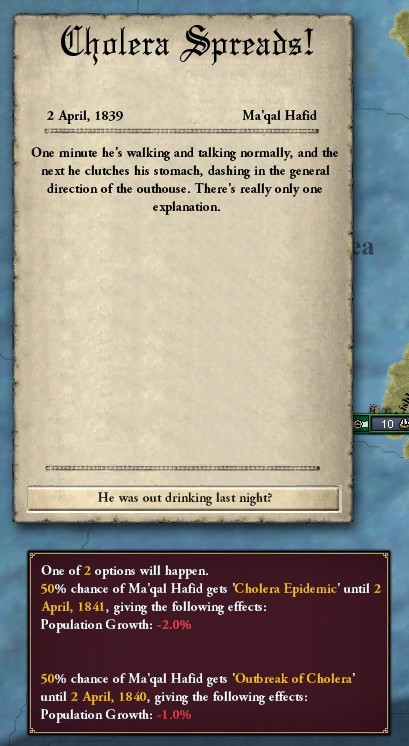
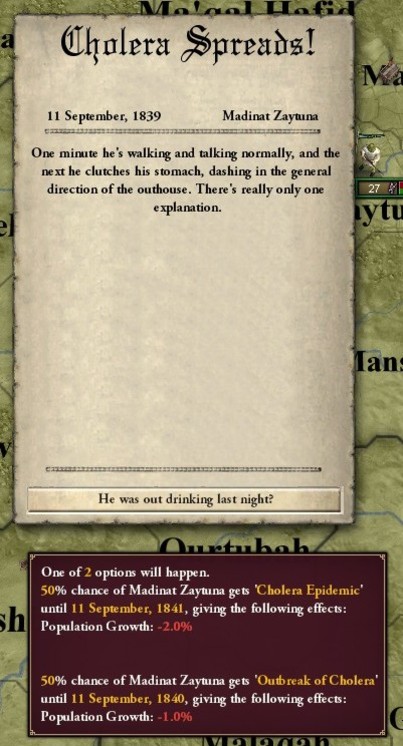

Thus, by the beginning of 1843, it isn’t much of a surprise to learn that the Andalusi population was firmly on the decline. The loss of the adult, male working population hit the economy especially hard, with the crisis peaking at 5000 deaths a month before averaging at around 3500 deaths.
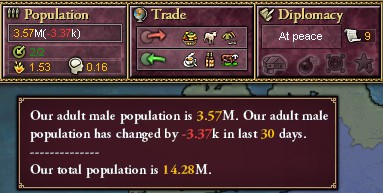
This minor population downturn wasn’t exactly a disaster, but with public morale now at an all-time low, it was clear that something had to be done. Significant research was thus made into the field of medicine over the next few years, and advances in bacteriology and virology allowed the government to implement more stringent public health programs, helping rein in the influenza and cholera pandemics.
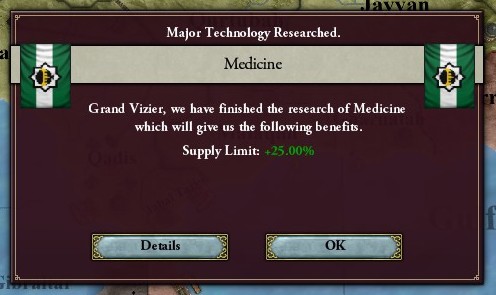

And unsurprisingly, it wasn’t long before these developments were reutilised and adapted for the military, opening up the new field of Combat Medicine. At the insistence of the Royalists, Medical Corps were set up in each regiment, consisting of medics that would not only treat illness and injury, but also use their unique position to trial new treatments and experiment with novel cures.
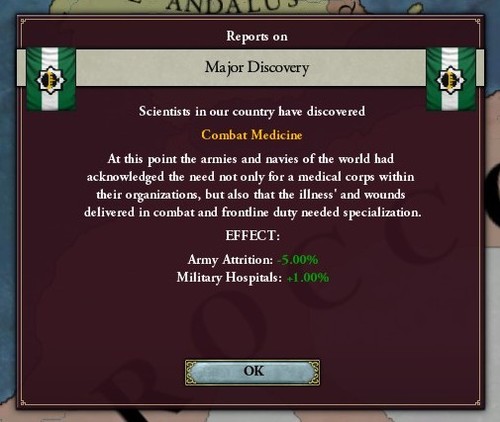
The moderates, meanwhile, were determined to bring stability back to Al Andalus. Now firmly in control of the pandemics, they managed to quicken the construction of several manufactories, with two being opened early into 1844: a glass factory in Granada, within easy distance of the local coal mines, and another liquor distillery in Ishbiliya.
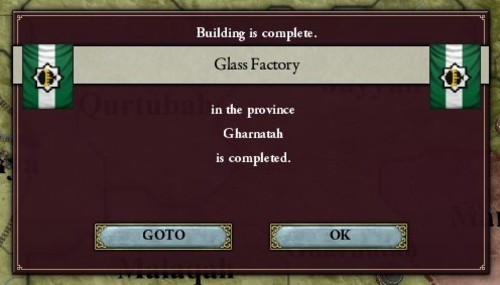
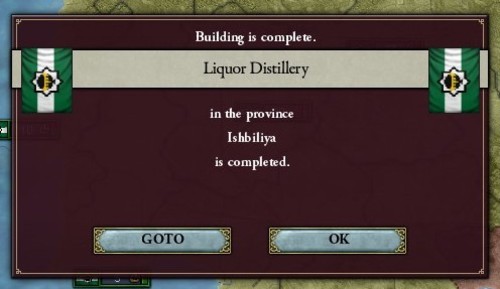
Sultan Utbah continued on his personal mission to boost support for the Zulfiqar dynasty. Shifting his attention to Tulaytullah, a city with a long history of supporting the Jizrunid dynasty, Utbah personally funded the restoration of countless monuments, public works, mansions and palaces that had been damaged by the Mahdist regime, even making it a habit to travel to the City of Sultans on an annual basis.

Across the Mediterranean, on the other hand, Andalusia’s distant cousins in Palermo were anything but stable. A series of revolts had rocked the country for the past decade, with public unrest eventually culminating in the outbreak of several nationalist rebellions on mainland Italy.
And with his army shattered by a decade of fighting in the Tirruni Wars, the Emir of Palermo could only watch as vast tracts of his territory in Central Italy broke free, quickly consolidated into the Kingdom of Napoli.
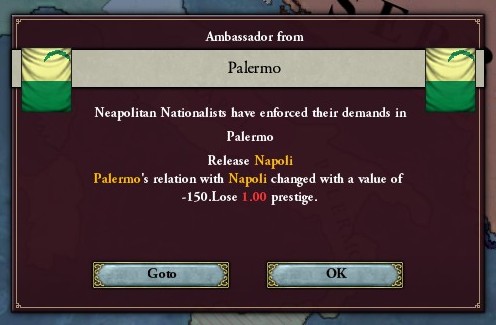

Moving across the Adriatic Sea, meanwhile, representatives of Hungary, Bulgaria and Greece met in a historic conference to finally settle the unanswered questions of the Congress of Cádiz. And after several days of negotiation and discussion, the three powers emerged to declare that they would ‘Refute the Congress’, ignoring the boundaries and restrictions set by the Great Powers, and seizing their destiny.
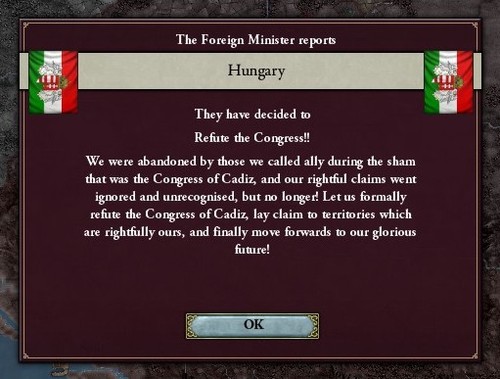
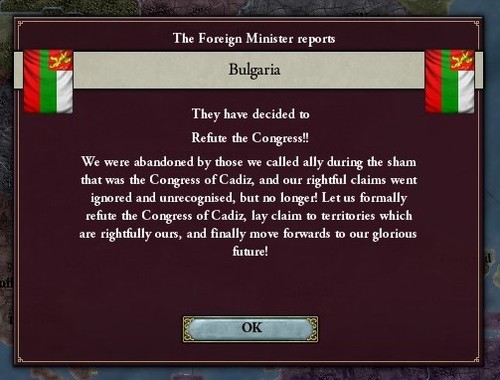
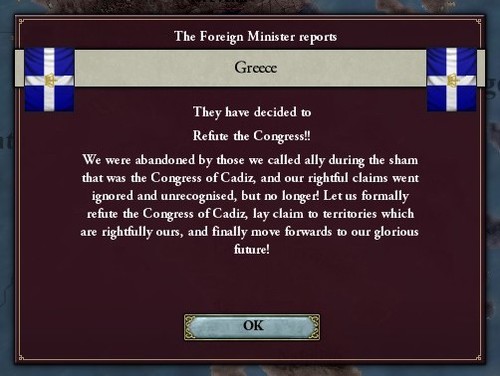
Many were puzzled as to what exactly this meant, but their confusion was cleared up within weeks, as the triple alliance of Hungary-Bulgaria-Greece declared war on the Kingdom of Serbia, determined to seize their territorial claims and redraw the borders of the Balkan peninsula. None of the Great Powers intervened to defend Serbia, making it clear they would abide by the terms of the Congress only as long as it benefitted them.

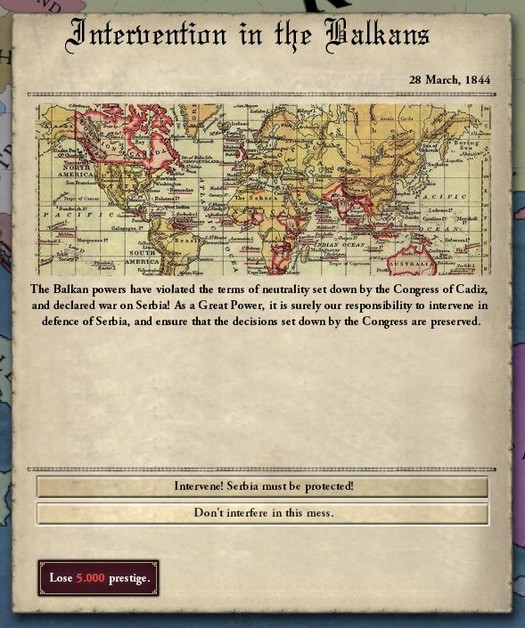
Further south, meanwhile, Hejaz accomplished its long sought-after goal by seizing the coastal city of Musqat. Arabia had not been united under a single power since the days of the Abbasid Caliphate, and with the entirety of the peninsula now under his control, the Sharif of Mecca could finally proclaim himself the rightful successor to the Prophet.
As is so often the case, however, the Sharif’s ambitions have only multiplied with his victories. He now looks to his oppressed Shia brethren in the Vali Emirate, to the Arabs chafing under Christian Outremer rule, to the false Caliph spewing lies in Armenia, and begins to dream of an Arabia that stretches from Aleppo to Aden.
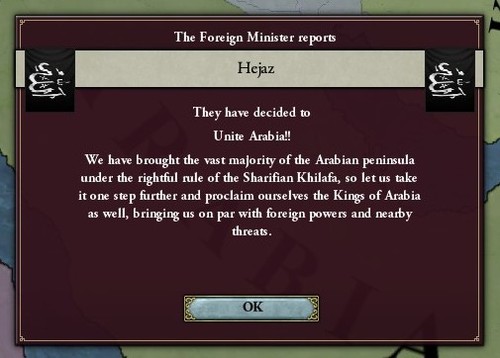
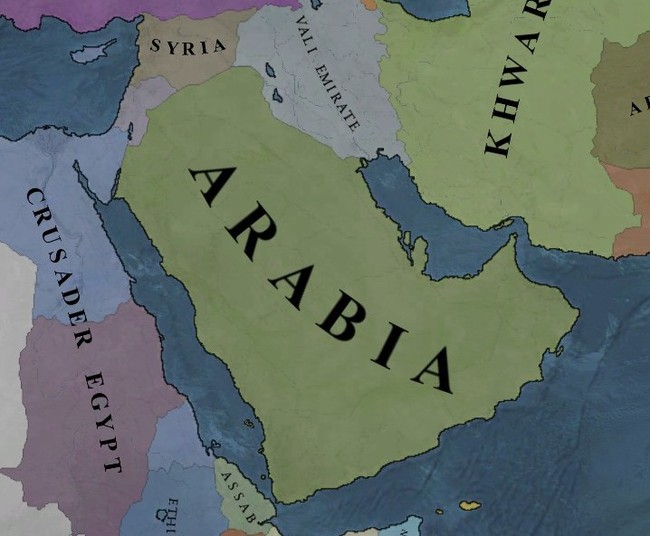
Pushing further east, the Republic of Japan also met with increasing success, as they easily overran Manchu forces and seized the capital of Yereven, eventually annexing the nation into their growing colonial empire.

It wasn’t long before the hawkish Japanese politicians turned their gaze further south, however, to the Liaodong peninsula. Harbouring a strategically-vital port, the peninsula would be essential to any invasions into China, so Japan was quick to declare war on the Qi dynasty. Unexpectedly, however, this declaration brought them into war with the Red Turbans and Wu dynasty as well - the three powers having formed a defensive alliance against Japanese aggression.
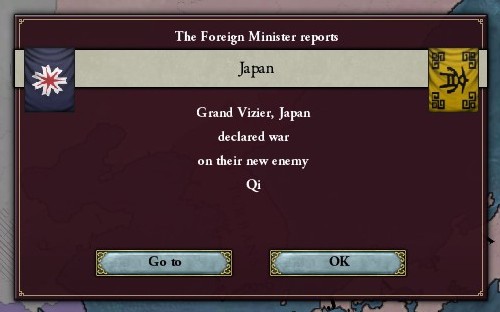
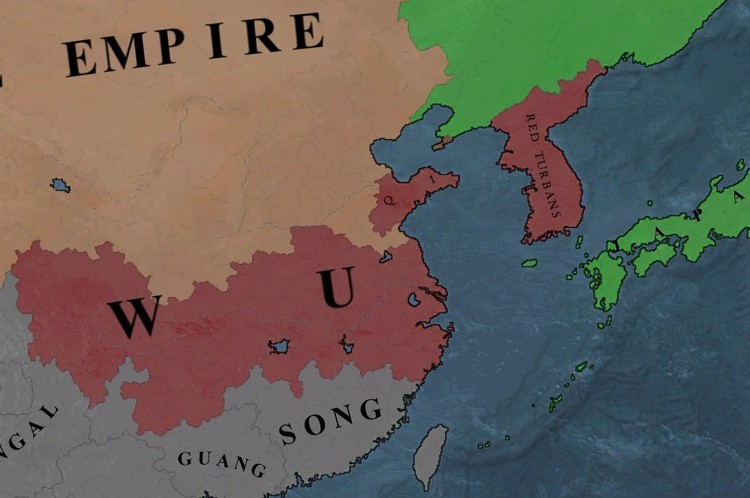
This defensive pact would prove to be pointless, however - the Red Turbans were essentially a feudal state, and the Wu dynasty were still locking horns with the Mongol Empire, so the Qi were left to face Japan alone. And a scant few weeks later, the war was over and peace treaties were drawn up, with the Japanese having stormed the Liaodong peninsula, seized the seaport of Lüshun and crushed the feeble Qi armies.
With the rich resources of Manchuria finally under their rule, the Republic could turn its attention elsewhere: to the vast tracts of uncolonised land in Siberia, to the foreign colonialists in Formosa and Indonesia, to the rich and divided warlords of China.
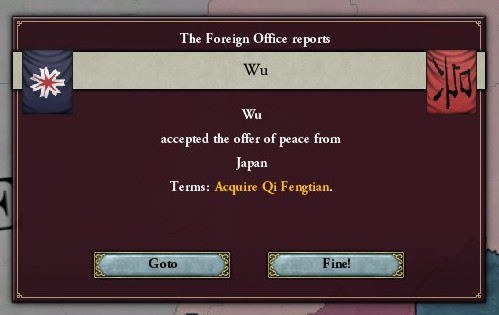
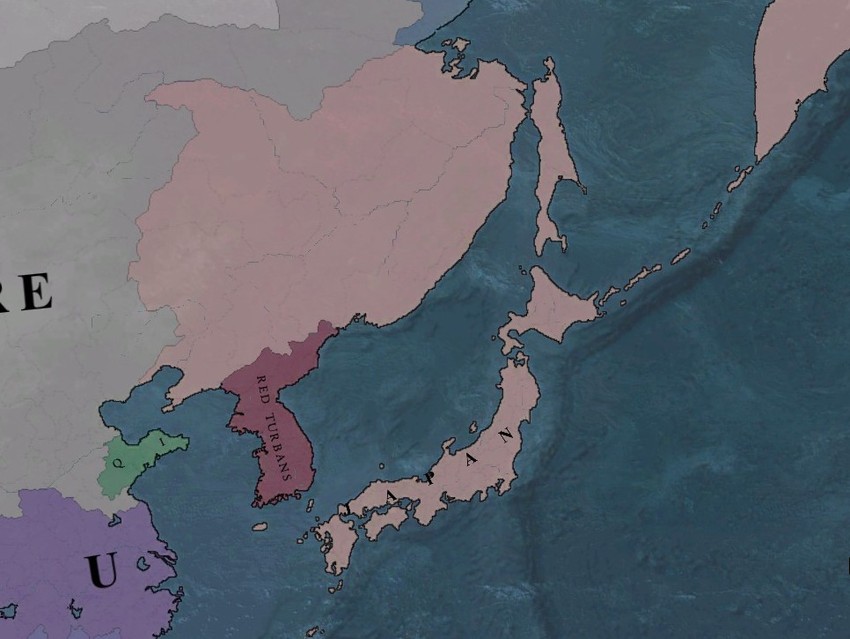
And China would never be as weak as it was then, or as enticing, that much is certain. The Wu-Mongol War had wrought destruction for thousands of miles in every direction, with neither side willing to concede defeat and neither side able to seize victory.
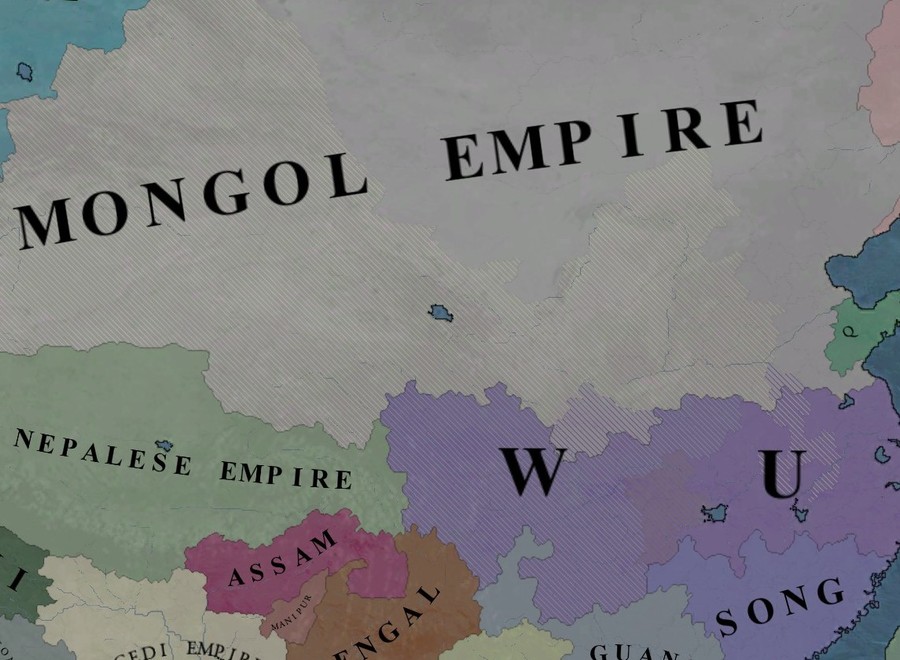
And what was the end result, after half a decade of carnage and butchery? A slight change along the Mongol-Wu border, with the Mongols finally agreeing to cede Henan and end the conflict. The Wu may have won the war, but it would quickly prove to be a pyrrhic victory, as internal dissent and foreign invasion tore their realm apart.
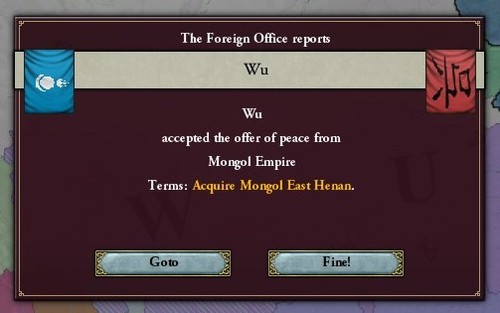
The fortunes of the Mongols weren’t much better, as reactionaries rose up en masse and overthrew the ruling sultan. The ruling caste were all executed or exiled, all westerners were expelled from the empire, and modernisation efforts were brought to a screeching halt.
Just five years ago, the Mongols were in the perfect position to become the dominating power in East Asia, with only Japan standing in their way. And now, unexplainable but undoubted, the Golden Age of the Mongols is at an end.
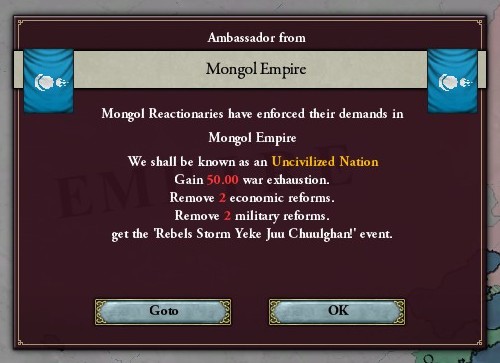
Back in Iberia, meanwhile, the fortunes of Al Andalus have gradually been on the rise again. Sultan Utbah had been very active on the public scene, and this continued with the opening of the Jaharra - a "hall of fame" that would house a variety of historical artifacts, statues, monuments, sculptures, venerations, paintings, calligraphy and poetry that would come together to paint a unique picture of Andalusi history.

The moderates’ investment into education had also continued in recent years, not just with new schools and literacy programs, but also with the opening of new government departments and commissions dedicated to the betterment of general education. Several bills for free public education were also presented to the Majlis, but they were largely refused for being too costly, with Uthman al-Houd notably pressing for greater military spending instead.

As for infrastructure, the success of Qadis-Ishbiliya railway had ignited something of a mania amongst the entrepreneurial classes, with dozens of new railway companies being set up over the past few years. The moderates were happy to fund these projects, and before very long, hundreds of miles worth of rail had been laid down in central and southern Andalusia, linking almost all major cities and industrial towns, whilst a more isolated rail system was constructed in the western provinces. Eastern and northern Iberia were limited by their harsh terrain, however, and further development into railway technology was necessary before any could be built there.
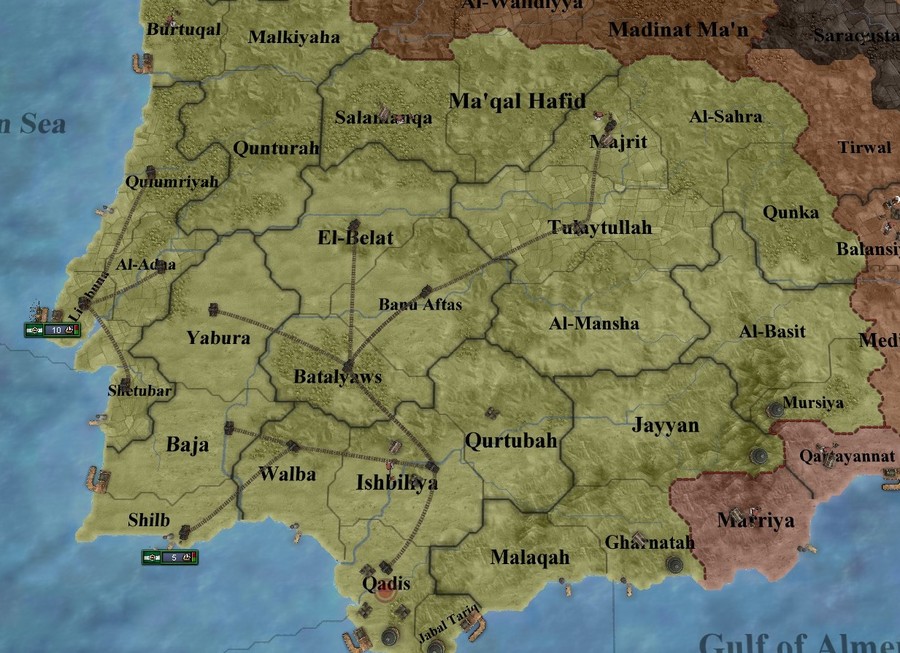
These railroads are still very primitive, but there’s no longer any doubt that the decreased transport times lead to huge improvements in local production and factory throughput, and the more-developed railways currently being researched will only further enhance these profits.
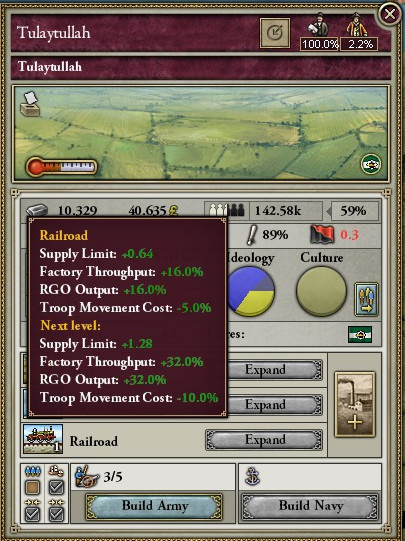
As 1844 draws to a close, however, so does the current term of the Majlis. And as their last act whilst in power, the moderates complete the construction of a series of forts along the Andalusi-Moroccan border, in anticipation of any conflicts coming in the next decade.
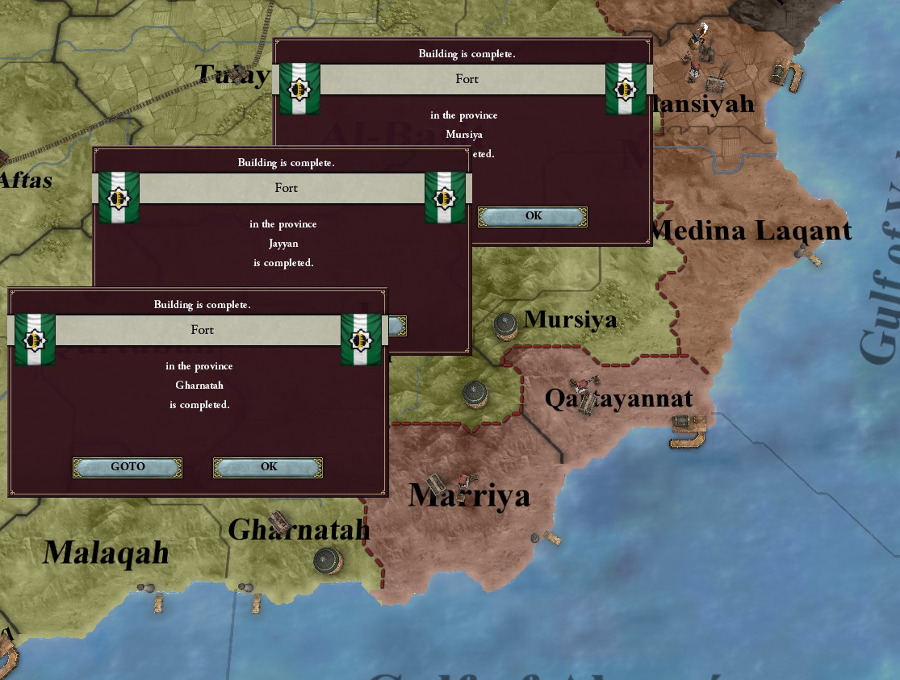
To the immediate north, meanwhile, several months of regency come to an end as a new king is crowned in León-Castille. Whilst Frederick von Wettin rises to the throne, however, newspapers all across Europe are caught by storm as several ‘Secret Clauses’ between the various powers of the Congress of Cádiz are discovered.
And this was the first, apparently. In return for supporting the Moroccan proposal for an independent Qattalun and northern Iberia, Hannover were rewarded by having their dynasty placed on the throne of León-Castille, improving relations between the two powers. Both the Berber and Hanoverian governments refuse to comment on this uncovering, but that doesn’t stop the European public from wondering just how many secret clauses there were, and what they could potentially lead to.
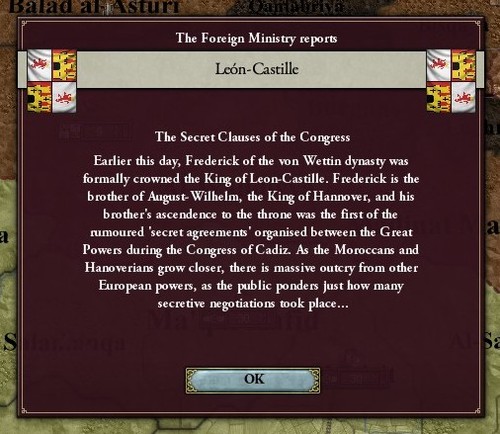
With Napoli breaking free in Italy, the Balkans erupting into war and the secret clauses now being exposed, newspapers in Qadis have denounced the Congress of Cádiz as nothing more than a sham.
In an attempt to deflect the sudden backlash, the Moroccans authorised the return of Sahim Tirruni’s body to Qattalun, where the famous revolutionary had wanted to be buried. This would quickly prove to be a foolish decision, however, as the sight of Tirruni’s coffin being carried across Barshaluna incited the outbreak of liberal revolts all across the city. The Emir of Qattalun, who was very wary after already being forced into exile once, immediately dispatched soldiers to end the rioting.
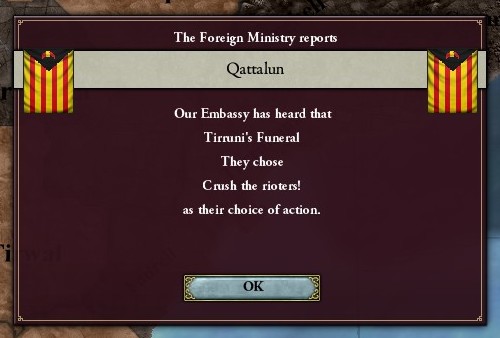
Ordinarily, that would’ve been the end of the matter, but Sahim Tirruni had turned himself into a martyr of revolutionary ideals, and the return of his body seemed to reignite the deeply-rooted liberal sentiments in Qattalun. Thousands of people rose up in a massive revolt in Barshaluna, demanding extensive democratic reforms and an end to absolute monarchy, and forcing the Emir to flee the city when they went unanswered.
And it didn’t end there, as the uprising was mirrored by a wave of liberal revolts all across Qattalun, then Iberia, then Europe. These past ten years have been relatively peaceful, but as tensions rise across the continent, there’s no telling what the next decade holds in store for us.
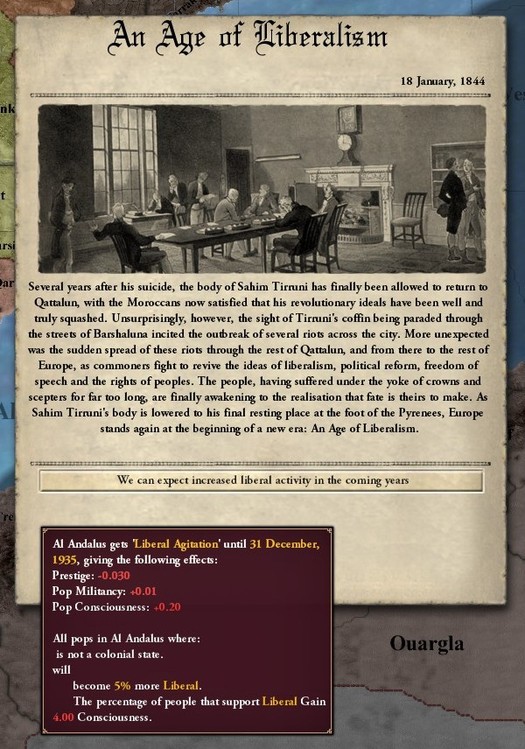
As the monarchies of Europe prepare to face the Liberal Revolutions, the most devastating and consequential war of the past decade finally comes to an end.
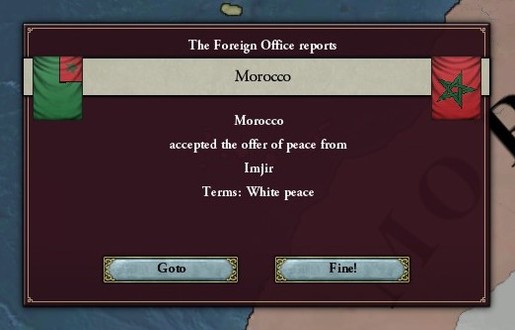
The Great Gharbian Revolt ends, at long last, with the rebelling colonial nations emerging victorious. The conflict spanned thirteen years and dozens of battles, battles which the Moroccans won more often than not, but they were gradually worn down by the Imjiri war of attrition, with the rebels avoiding pitched battles and utilising their terrain to force 30,000 Moroccan casualties in the last year alone.
The final death count stands at 168,000, with the vast majority of casualties belonging to the rebels, but all the loss and hardship has galvanised the newly-independent nations and instilled a powerful sense of national consciousness into their people - no longer are they simply Berbers, but now they’re Imjiri, they’re Walidrari, they’re Nuqurili.

The war had been long and ruinous, however, that much can’t be denied. And as Ibriz and other great powers look greedily to the new nations of South Gharbia, the three countries quickly grow nervous, eventually agreeing to meet in what would later be called the Congress of Imariz.
The early weeks of the congress were spent reaffirming alliances, rectifying territorial disputes, opening up trade blocs and agreeing on a new currency. These were all simply sideshows, however, as the talks were all building up to one thing: unification.

Imjir and Walidrar were strongly in favour of such a union, with the former eager to challenge Ibrizi dominance in the new world, and the latter desperate for protection from its aggressive neighbours.
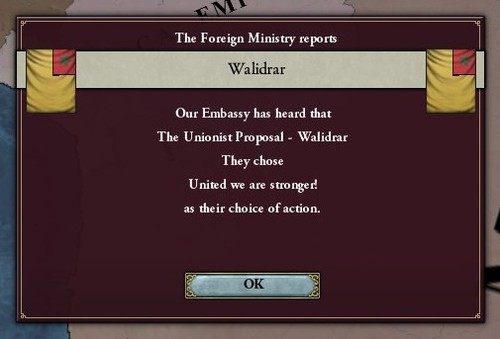
The representatives of Nuquril weren’t so enthusiastic, however. A strong Nuqurili identity had been borne out of the Moroccan invasion, and they weren’t willing to relinquish this identity for a federation in which Imjir would undoubtedly have the dominating voice.
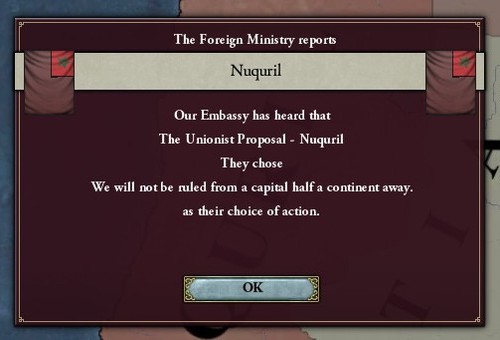
The Congress of Imariz thus broke down into hot-blooded arguments and slanderous insults, with Nuqurili diplomats eventually storming out of the talks in a fury. Imjir wasn’t going to abandon their ambitions so easily, however, and if Nuquril wasn’t going to join their union willingly, then there was only one option left to them.
They would be taken by force.
